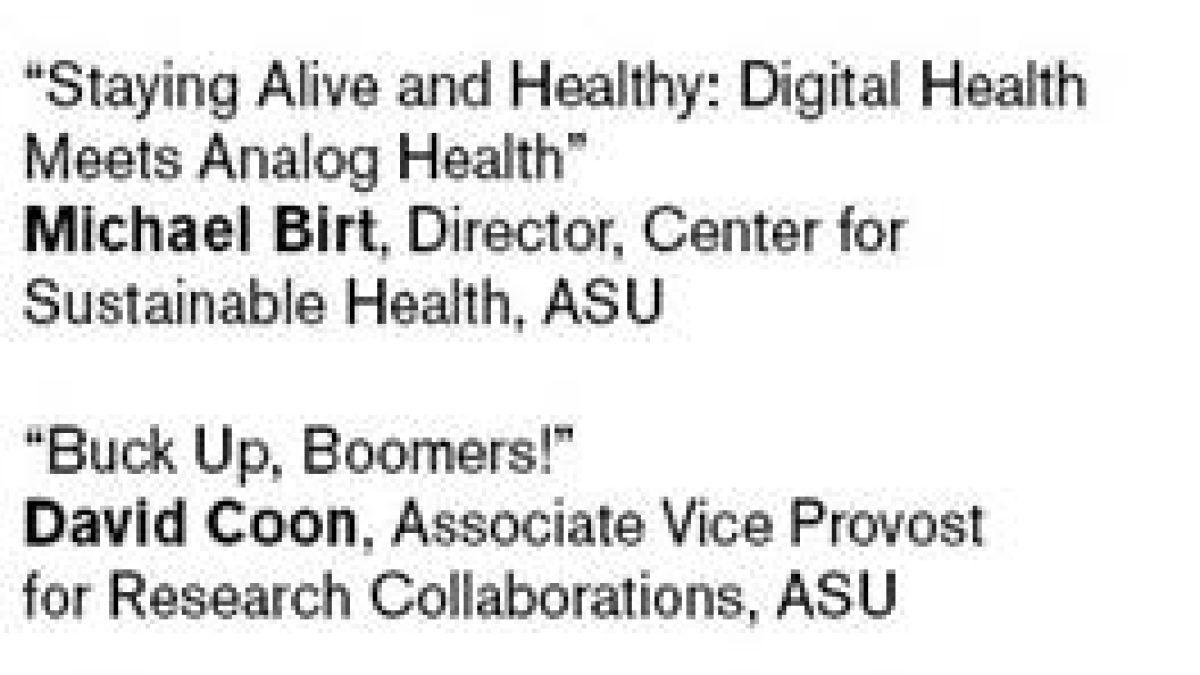Prominent scientists to speak on breakthroughs in optimal aging

Getting old isn’t what it used to be. Seniors are living fuller lives thanks, in part, to significant breakthroughs in research. But, sorting through all the clutter isn’t easy. That’s why the Osher Lifelong Learning Institute at Arizona State University has put together an event featuring speakers who are top researchers in their fields.
“Abundant Aging and Longevity” features six fast-paced 20-minute presentations on the latest health and well-being topics important to seniors and their families. It will be held at the ASU Downtown Phoenix campus, Feb. 15.
The Osher Lifelong Learning Institute, part of ASU's College of Public Programs, connects older adults with the intellectual, cultural and social resources of ASU.
“These scholars will make it clear. The medical breakthroughs of the past decade have been amazing, but breakthroughs in understanding of the human element of aging are equally amazing,” says Richard Knopf, director of the Osher Lifelong Learning Institute at ASU. “How we live out our lives – socially as well as medically – has great influence on our capacity to live abundant lives!”
Alzheimer’s research specialist Eric Reiman, MD, will talk about the progress made in treating the debilitating disease and what researchers are doing to find prevention therapies that work as quickly as possible.
“With the growing number of people living to older ages, there is an urgent need to find treatments to prevent the clinical onset of Alzheimer’s disease,” says Reiman, director of the Arizona Alzheimer’s Consortium.
Other topics include: “A Trip Down Memory Lane: The Science of Hormones and Remembering,” presented by behavioral neuroscience professor Heather Bimonte-Nelson; “Staying Alive and Healthy: Digital Health Meets Analog Health,” with Michael Birt, director of the Center for Sustainable Health at the Biodesign Institute; and “Buck Up, Boomers.” The later talk will be given by ASU health professor David Coon, who specializes in evaluating and designing solutions for older adults facing chronic illness.
“If it’s not your issue, it will be!” says Coon about the need for family members to get involved in the long-term care of their loved ones. “But, boomers must learn to balance caregiving responsibilities with self-care activities that help them maintain their own health and emotional well-being.”
The Osher Lifelong Learning Institute event also features a presentation by ASU School of Life Sciences director Brian Smith. He’ll explain what studies of animals with simple nervous systems, such as bees or mice, can tell us about the dynamics of human aging and maintaining a healthy brain. Mark Lussier, chair of the ASU English Department, will present “The Romantic Book of Living and Dying,” looking at literary and cultural practices that help people master the wisdom of making every moment count.
“Abundant Aging and Longevity” will be held from 9 a.m. to noon, Feb. 15 at the Nursing and Health Innovation Auditorium (room 110) at the ASU Nursing and Health Innovation Building II, 550 N. Third St. in downtown Phoenix. The event costs $10 to attend and requires membership in the Osher Lifelong Learning Institute ($15), which offers low-cost classes and lectures throughout the year. Register online at lifelonglearning.asu.edu or call (602) 543-6440.